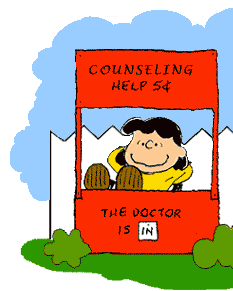Actually, I've had several people ask. I love what I've studied and therefore love the opportunity to talk a little bit about it. Truthfully, my favorite blogs to read are the ones that give me a glimpse into an experience in which I'm not, and most likely will never be, acquainted (from reading about applying to med school to self-publishing a book), so that's my intent here. My goal is to put out some sort of psychology topic on Sundays, hence the oh-so-creative title for this "series", PsychSunday.
So, without further ado...
Once I finish my summer class, I will have earned my Master's of Science in Counseling Psychology degree (MSCP). Universities across the country vary in offering MA and MS degrees. This is an expert from a counseling blog that sums up the difference, though the biggest difference is likely the color of the hood received at graduation.
MA: Master of Arts. Clinicians who hold this degree are generally educated in programs that combine coursework and applied practicums. If they are also licensed, these individuals are either counselors or therapists, often depending on their theoretical persuasion.
MS: Master of Science. Also counselors or therapists, these professionals come from degree programs that focus more on research (hence, science). For all intents and purposes, the Master level degree carries about the same weight when it comes to applied practice.Basically, this degree prepares students to assess, diagnosis, and provide treatment for mental health disorders. That is a very general statement considering that the recommendations for licensure vary from state to state. My program at Avila University meets the requirements for students to pursue licensure in the states of Missouri and Kansas.
Master's programs often vary in credit hour requirements. Master's degrees in the teaching field are often 30-ish hours and the IT program Derek is starting is also in the 30 hour range. Due to state licensing requirements, my degree requirement consisted of 60 credit hours, all of which were required to be obtained in the physical classroom. While their universities that offer online courses that count toward graduation, those courses are ineligible to count towards licensure (which means you'd have to take them over again in a brick and mortar school). At times, it was a real pain to travel to school especially knowing that there are thousands of other people are obtaining their degrees in sweatpants on their couch. However, counseling and psychology (often considered two distinct fields) are very social fields. The experience of classmates, group projects, and even observing the demeanor of the professors are huge components to the learning experience.
The coursework required for this program includes counseling skills, theories, assessments, developmental psychology, diagnostics, statistics and research, along with some cognitive and biological psychology classes too. Of course, there is practicum and internship too, though I'll share about those next week!


Congratulations on finishing!! As someone who also has a counseling masters from a traditional university (as opposed to online) yet works side by side with counselors who obtained an online 30 hr degree. I am very thankful for the 60 hour in-person degrees. My three semesters of interning really changed my entire view of what a counselor is. Without the classes and groupwork I never would have truly understood some of the techniques and possibilities of a counseling relationship. I am super thankful I went to a traditional school for my masters instead of a mini-degree online (They can't be licensed, only work in a school setting). I have to say though I have considered getting my Ed.S online - I finally finished my license in February and looked into Ed.S the week after, lol! My husband said I was crazy and needed to at least give birth before I considered it... definitely a good idea!
ReplyDeleteAnyways, congratulations!